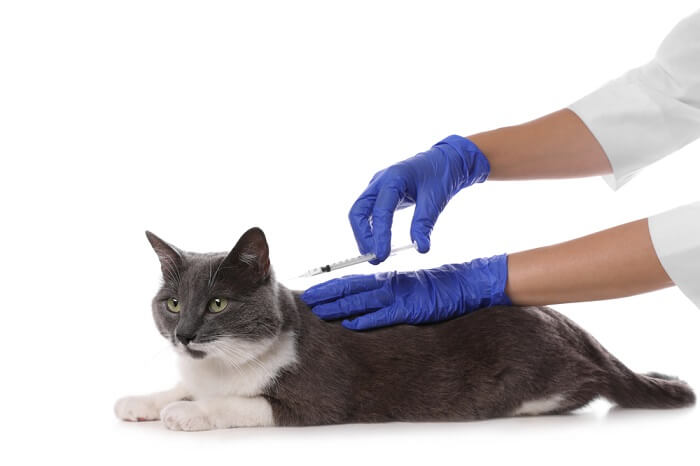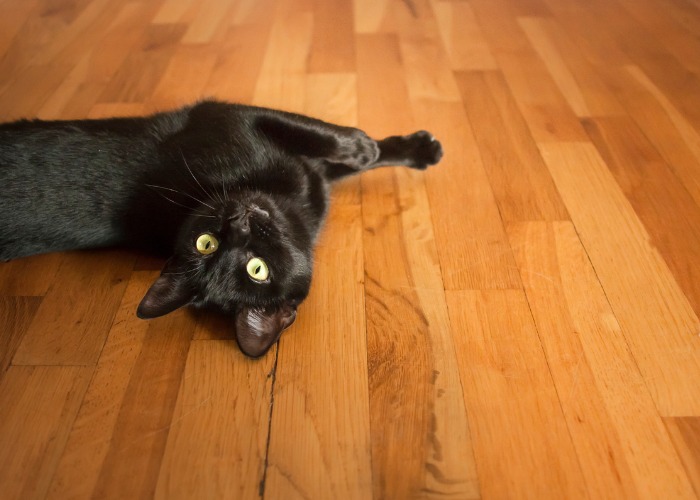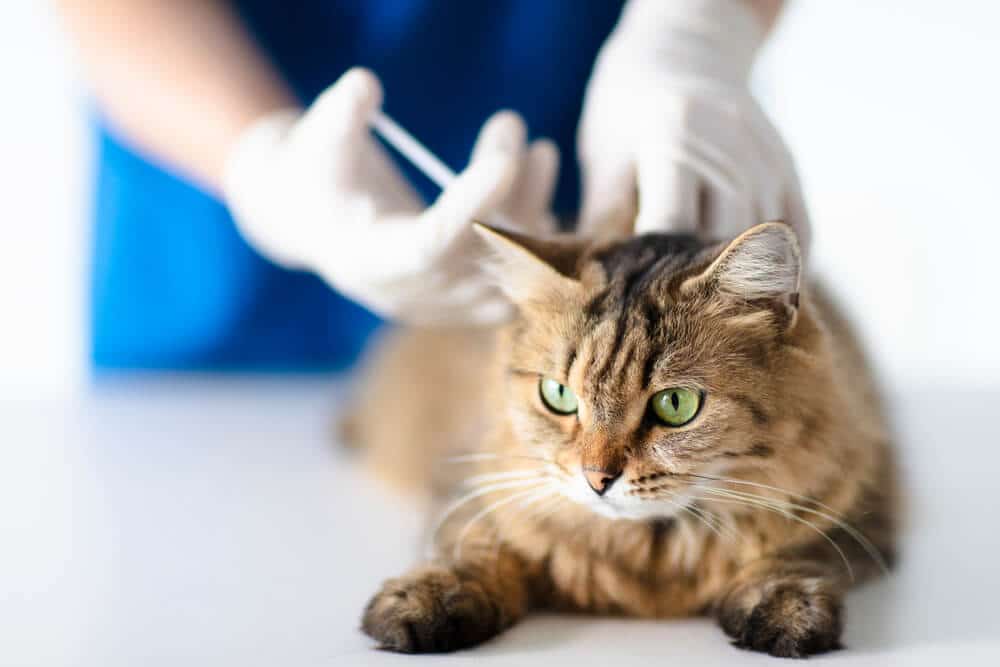Cerenia for Cats: How It Works, Side Effects, and More (original) (raw)
Cerenia is the brand name for a drug called maropitant, or to use its full name, maropitant citrate. Maropitant is a neurokinin-1 (NK1) receptor antagonist which was developed by Zoetis (formerly Pfizer) specifically for the treatment of motion sickness and vomiting in dogs.
## Cerenia for Cats Overview

Medication Type:
Antiemetic
Prescription Required?:
Yes
Life Stage:
16 Weeks Or Older
Common Names:
Maropitant Citrate
Available Dosages:
Tablets: 16, 24, 60, & 160 mg Injection: 10 mg/ml
Expiration Range:
3 Months Refrigerated (Injection)
It was approved by the FDA in the United States in 2007 for use in dogs, then in 2012 for cats. Cerenia is now widely used for cats in veterinary clinics around the world.
The primary use of Cerenia for cats is as an anti-emetic i.e. to stop nausea and vomiting. It works by intervening with the vomiting process in the brain.
Vomiting is normally prompted when impulses from the chemoreceptor trigger zone (CRTZ) in the brain are sent to the vomiting center in another part of the brain known as the medulla.
Cerenia suppresses these impulses so that vomiting is no longer prompted.
More specifically, Cerenia is a neurokinin-1 (NK1) receptor antagonist that stops substance P from binding to NK1 receptors. NK1 receptors are intimately involved in the initiation of vomiting. As well as in the chemoreceptor trigger zone (CRTZ) and the vomiting centre in the brain, they are found in the vagus nerve (close to the digestive tract).
Substance P is the key neurotransmitter involved in vomiting, and it’s found at all three of these locations. Cerenia has a similar structure to Substance P, allowing it to bind to the NK1 receptors in the same way as Substance P, but without causing the same stimulation.
It’s the ubiquity of the action of Cerenia—at three different sites from the digestive tract to the brain—that makes it so effective as an anti-emetic.
Uses of Cerenia for Cats

Here are a few of the most popular uses of Cerenia for cats:
- Cerenia is primarily used to control nausea and vomiting in cats, including motion sickness.
- One specific long term use is to prevent vomiting in cats with renal failure.
- Veterinarians often use Cerenia to treat acute vomiting episodes.
- Cerenia can also be used as a mild form of pain relief. It is sometimes used in surgery, reducing the pain felt during manipulation of internal organs during procedures such as spaying, and hence reducing the amount of general anaesthetic agent needed (this is known as an “anaesthetic sparing effect”).
- Finally, Cerenia has been found to help to prevent itchiness in cats with non-flea, non-food-induced hypersensitivity dermatitis.
How It’s Administered?

Cerenia Injections for Cats
Cerenia is usually given to cats in the injectable form a dose of 1 mg/kg body weight (1 ml/10 kg body weight) as a subcutaneously administered injection, but it can also be given as an intravenous injection. Drug administration can continue once daily for up to five days.
Cerenia Tablets for Cats
Cerenia tablets are also available, formulated for oral use in dogs. Although Cerenia tablets aren’t licensed to be given to cats, some DVM texts advise that this is possible for certain selected cases. Cerenia should only be given to cats in this way when recommended by the consulting veterinary surgeon.
Side Effects of Cerenia for Cats
The principal adverse reaction is pain and/or vocalization which is reported in around one in three cats when Cerenia is injected. This may last up to a few minutes but passes without the need for treatment. If Cerenia injectable is refrigerated before the injection is given, this pain reaction may be lessened compared to administration at room temperature.
There are a few other common side effects.
Product information sources mention that rarer side effects after the injectable solution is given include fever/pyrexia, dehydration, lethargy, anorexia, hematuria, hypersalivation (drooling) and injection site swelling, but each of these only happens in less than 1-2% of cases.
As with all products, an unexpected allergic reaction is also possible.
Some owners may experience allergic skin reactions themselves due to topical exposure to the drug after handling tablets, perhaps associated with skin sensitization, so it’s advised that people should wash their hands after administering tablets to their pets.
Drug Interactions
Cerenia is a protein-bound drug, and its use at the same time as other protein-bound drugs has not been studied. Such drugs include NSAIDs, cardiac and anticonvulsant medications. For this reason, cats that are being given such medications concurrently should be monitored particularly closely.
Risk Factors

The use of Cerenia has not been studied in pregnant or lactating cats and it should not be used in kittens under sixteen weeks of age.
Cerenia must only be used in specific, appropriate situations with close attention to prescribing information. Safe use of Cerenia has not been assessed in cases of vomiting where the underlying cause is gastro-intestinal obstruction or ingestion of toxins.
Veterinarians may be concerned about the risk that the medication could mask clinical signs, creating an illusion that such a patient is recovering because the key sign of vomiting has been suppressed, when in fact there is still an ongoing problem.
Cerenia should be used with care in cats that are suffering from hepatic dysfunction (liver disease), as the drug is metabolised by the liver. Vets may recommend a reduction in dose by 25-50% for such patients.
Conclusion
Cerenia (maropitant) is a useful addition to the veterinary pharmacy for the prevention of acute vomiting, or to help cats who are feeling nauseous or are suffering from vomiting due to certain causes. It is a highly potent medication that’s very safe, but it needs to be used in the correct situations.
Drug Dosing Disclaimer: We are only able to provide doses for medications that are FDA approved for use in cats and only as the label guidelines dictate. For medications that are used off-label we can only provide guidelines and safety information for use. Safe and appropriate dosing for off-label medications can only be determined by a primary care veterinarian.
We encourage you to work with your veterinarian to determine if a particular medication is appropriate for your cat. Changing or adjusting a dose for your cat on your own without consulting with a veterinarian can carry risk. We do not encourage use of medications prescribed for human use in pets without first consulting with a primary care veterinarian.
Frequently Asked Questions
Will Cerenia stop my cat from vomiting?
Cerenia is a prescription-only anti-emetic. It has to be prescribed by a veterinary professional, rather than a medication to be selected by pet owners. The drug is not suitable for every case of vomiting in cats, so the choice of the product as a way of treating any individual case is always a decision for the veterinarian treating a particular animal.
Will Cerenia help a cat that's suffering from weight loss?
There are many possible causes of weight loss, and while Cerenia may help some cats that are losing weight partly caused by repeated vomiting, it may not be appropriate for other cases. This is why Cerenia must only be given when recommended by a veterinarian.
Is Cerenia safe for cats?
Cerenia is a safe product, with the only common problem being the transient pain reaction that can happen when the injection is given.
When cats were given up to five times the recommended dosage doses daily for fifteen consecutive days, there were no discernible adverse effects either clinically (the animals seemed well) nor in laboratory tests (using blood and urine samples).
How long does it take for Cerenia to take effect?
The drug works rapidly, reaching its full effect within 30 minutes to two hours.
What if I miss a dose?
As a once-daily product, if a dose is missed, the normal dose should simply be given the following day at the normal time. There is no need to give a higher dose.
Does Cerenia make cats sleepy?
Sleepiness is a rare side effect. Less than one in fifty cats may experience some lethargy, sleepiness or loss of appetite.
Where can you buy Cerenia for cats?
Cerenia is a prescription-only medication, meaning that it can only be obtained through veterinarians, on their recommendation for a particular case.
